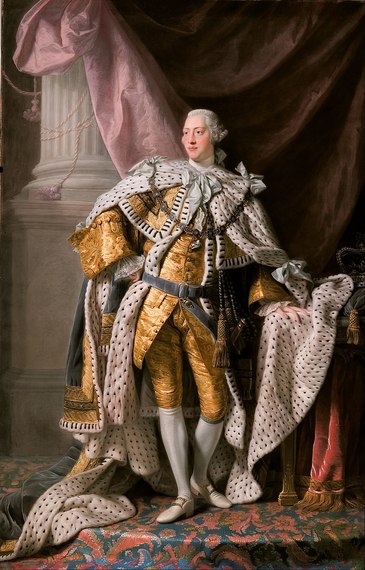|
The Broadway musical ‘Hamilton’ has been an absolute smash hit, both in America and London. Even if one is not familiar with the historical context of the production, they may well have heard one of the catchy songs from the musical itself. Tickets for Hamilton are certainly not cheap - demand for seats has far exceeded supply! Along with appearances from the 'Founding Father' Alexander Hamilton, the production features three comical songs from the British King George III, who reigned from 1760 to 1820, directed at his troublesome and revolutionary colonial subjects on the other side of the Atlantic.
For many, this may well be the first time they have encountered George III as a historical actor. King George III did indeed support the raft of Parliamentary legislation aimed at bringing the American colonists to heel, notably under his Prime Minister Lord North in the turbulent 1770s. In this period, the Boston Massacre, the Tea Act, the Boston Tea Party and the ‘Coercive Acts’ heightened tensions and galvanised the wrath of American Patriots in the Thirteen Colonies towards British rule. Moreover, Thomas Paine labelled George III as the ‘royal brute’ in his 1776 pamphlet ‘Common Sense’, while the Declaration of Independence of the same year accused George of trying to establish an ‘absolute tyranny’ in British America. All in all, a pretty damning critique! The validity of these claims is, of course, subject to debate. The musical Hamilton has certainly brought these issues back to the forefront of public and historical consciousness. But, there was more to King George III than America and tyranny. George III was the first of the Georgian monarchs to style himself as a proud British - as opposed to a Hanoverian - King. English was his first language, not German, unlike George I and II. Indeed, George III never even visited his throne in Hanover. He took a great interest in the art of Kingship, writing numerous essays on the topic as an adolescent. George had a particular penchant for farming and a keen interest in the system of enclosure that was engulfing England at the time - hence his nickname 'Farmer George'. In 1769, George's thirst for knowledge resulted in him building the Royal Observatory in Richmond, in which he took great pleasure. George was - by all accounts - committed to his large family and his wife, Charlotte of Mecklenburg-Strelitz, who lent her name to Charlotte, North Carolina (which, incidentally, Lord Cornwallis identified as a ‘hornets’ nest of rebellion’ during the American Revolution). George III may have been the last King of America, but he was also the first King of Australia, reigning over his Kingdom during a time of vast social, economic and industrial change. Few would doubt that George was a ‘hands-on’ sovereign, taking great pride and an intense interest in the ruling of his realm. He is Britain’s third longest-reigning monarch, behind Victoria and Elizabeth II. He was, perhaps, the last British sovereign to exercise bona fide executive power. His son, the Prince Regent and subsequently King George IV from 1820 to 1830, was certainly a great deal less popular with the British people than his father had been. Mental illness incapacitated George III for the last years of his life - a fact which is directly referenced in the songs by George III in Hamilton the musical. Hopefully, the musical itself will serve to inspire those interested in the production and historians to learn more about the ‘Mad King’. There was - whatever your opinion on King George III - certainly more to him and his reign than America and mental illness. I would love to hear your thoughts! Patrick O’Shaughnessy (@historychappy) Co-Editor of Versus History
1 Comment
Alex Seeley
9/5/2020 20:01:18
For those of us who have not seen Hamilton, how is George portrayed?
Reply
Leave a Reply. |
Categories
All
Archives
April 2024
|

 RSS Feed
RSS Feed